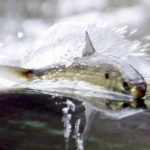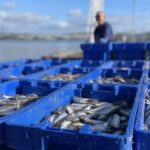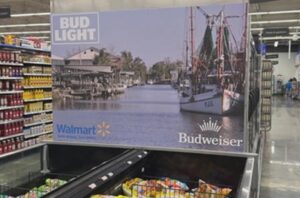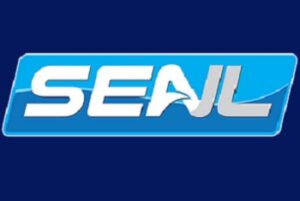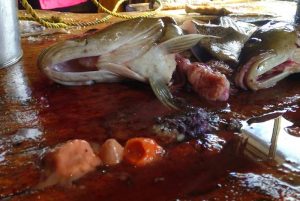Tag Archives: National
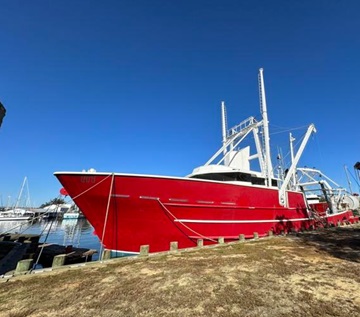
County lawmakers request fishery resource disaster determination amidst nationwide shrimp disaster
On Sept. 18 the Pamlico County Commissioners adopted a resolution urging North Carolina Governor Roy Cooper to consider submitting a request for a fishery resource disaster determination to the NC Secretary of Commerce. Craven County followed suit and adopted a similar resolution on October 2. According to these resolutions, the global supply of farm-raised shrimp imports into the United States has reached record highs. This imported shrimp now dominates cold storages, distribution hubs, and the American market at a level that is devastating to US operators. This influx of imported shrimp into the American market has caused significant revenue loss, and loss of access to the shrimp fisheries themselves, for small family-owned supporting businesses, and other supporting businesses. >>click to read<< 09:47

National mental health campaign targets commercial fishermen
The commercial fishing industry is known for its grueling work conditions and unpredictable nature, which can take a toll on the mental health of fishermen. However, despite the evident need, the industry has historically been underserved in terms of mental health care resources. Recently, the Maine Coast Fishermen’s Association and Northeast Center for Occupational Safety and Health teamed up to work with Man Therapy to create a campaign specifically targeting commercial fishermen. Man Therapy is an innovative approach that uses humor and relatable content to raise awareness about mental health care and provide resources for fishermen, according to a press release.>>click to read<< 09:45
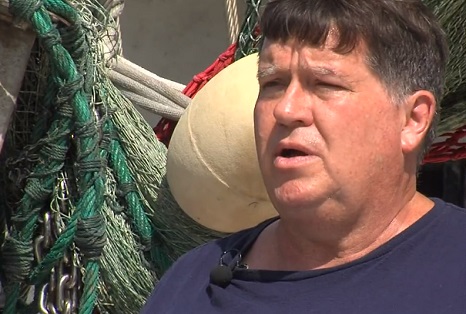
‘A Gulf and National Issue’: Southeast Texas shrimpers struggling to survive due to influx of imported shrimp
With an an influx of imported shrimp taking over the market, it’s becoming tougher for Southeast Texas shrimpers to survive. Since July 16, the Texas waters opened back up for fishing, but Eric Kyle Kimball’s boat “The Seahorse” has yet to leave the dock at the Sabine Pass Port Authority. Kimball is a third generation fisherman who’s been around the industry for 55 years. This career help provides for him and his family, with brown shrimp being the main source of income. Shrimp imported from across the globe are driving prices down from $3.75 per pound in the 80’s to 95 cents per pound, currently. After paying for fuel and deck hands, area fisherman can’t break even. Video, >>click to read<< 09:49
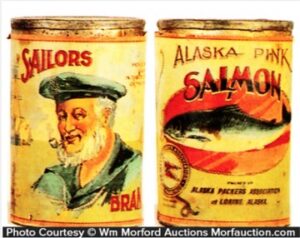
Know-nothing journalism
Credibility dies in a field of little mistakes. This is why it is painful to read what passes for news today: “Pink salmon get their nickname from their propensity to bite on anything pink.” Or so reported Gregory Scruggs of The Seattle Times after visiting West Seattle’s Lincoln Park on Aug. 22 for a story on Life/Outdoors in the Emerald City. Yes, and red salmon got their nickname for their propensity to bite on anything red and silvers on silver. And don’t forget those dog salmon. Note to the unwary: Leave Fido at home if you decide to pursue the latter. They have a propensity to bite on dogs. This is the reason there are so many three-legged dogs in villages along the Yukon River. All of this would be funny if, of course, it was funny. >>click to read<< 10:18

Celebrate Whale Week with NOAA Fisheries: A message from Janet Coit, Assistant Administrator
At NOAA Fisheries, our team of dedicated scientists and managers is responsible for the health and sustainability of more than 30 whale species in U.S and territorial waters. Every year, we spend a week taking a deeper dive to share our whale expertise. This year is particularly notable because it is the 50th anniversary of the Endangered Species Act. Some of the most recognizable whales—North Atlantic right whales, Southern Resident killer whales, and Cook Inlet belugas—are at the top of our Species in the Spotlight initiative. >click to read< 18:33

The windmill energy fantasy of net-zero carbon emissions is a dangerous ideology jeopardizing national and economic security.
Where is Don Quixote when we need him? His fantasy was to slay giants (in reality, windmills) in his quest to fight injustice through chivalry. Green energy proponents have a carbon dioxide “net zero emissions” fantasy of powering civilization through green energy windmills and solar panels. Green energy advocates are for building windmills with trillions of taxpayer dollars and displacing existing energy and transportation industries. The result is weakening America and aiding the Chinese Communist Party’s (CCP) quest for world domination. Don Quixote’s quest was a fantasy. Green energy advocates’ quest for “net zero” power emissions is also a fantasy — a dangerous fantasy for America. >click to read< 10:38
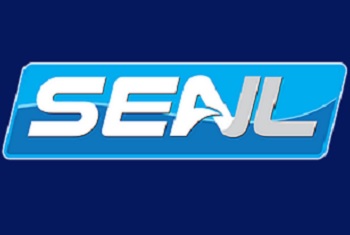
SEA-NL condemns FFAW-Unifor election; union credibility spent
Seaward Enterprises Association of Newfoundland and Labrador (SEA-NL) condemns the election Thursday of FFAW-Unifor president Greg Pretty, saying the corrupt process undermines faith in democracy, and the union’s ability to hold governments to account. “The election reeked of hypocrisy, and the FFAW’s credibility in this province has been spent,” says Merv Wiseman, a local expert on organizational governance and a member of SEA-NL’s board of directors. “The FFAW cannot hold the federal or provincial governments to account for fisheries management when the union’s own governance is a joke to the very industry it represents.” >click to read the rest< 14:37
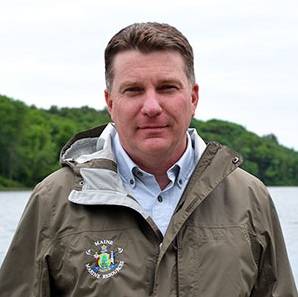
Message from Commissioner Keliher: Federal Budget Package Includes Pause on Whale Regulations and Needed Funding for Research
Finally, some good news for Maine’s lobster industry. Today, the U.S. House of Representatives followed the lead of the U.S. Senate and voted to approve the omnibus spending bill to fund the federal government. This budget package includes a six-year pause on new federal whale regulations, money to gather needed data including the presence of whales and phytoplankton, and funding for the development of innovative gear technology that will keep the fleet fishing. We expect the President to sign this legislation in the coming days. Here are the major provisions: >click to read< 08:29

Company touts benefits of micro nuclear reactors for rural Alaska
Alaskans looking for clean, safe energy sources should consider nuclear power, according to a company that is working on developing a micro nuclear reactor it says will be particularly suited for rural Alaska. Westinghouse Electric President Eddie Saab made a presentation Friday in front of Word Trade Center Anchorage, a private non-profit that focuses on trade and business opportunities. Saab told the crowd that the micro-reactor they’re developing, the eVinci, is small enough to be loaded on a truck or placed on a barge. Perfect, Saab says, to provide stable power for remote locations. >click to read< 12:59
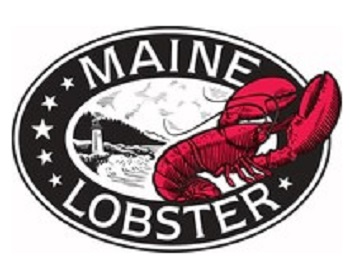
This National Lobster Day, Sept. 25th, Help Support the Maine Lobster Industry
The Maine Lobster fishery is one of the most sustainable fisheries in the world, thanks to the hard work by generations of lobstermen to protect both the lobster resource as well as Maine marine environment for more than 150 years. This includes decades of proactive changes to protect endangered right whales, including weakening lines, removing thousands of miles of rope from the water, and converting all ‘floating’ rope to safer ‘sinking’ rope. Yet, this month, the Monterey Bay Aquarium’s Seafood Watch program placed Maine Lobster on its “Red List” of seafoods to avoid, citing protection of right whales, ignoring decades of good faith conservation management and despite a lack of evidence of Maine Lobster fishery’s impact on the species. In fact, zero right whale deaths or serious injuries have ever been attributed to the Maine Lobster fishery. Here’s what you can do to do support the independent, hardworking fishermen of Maine: >click to read< 12:00
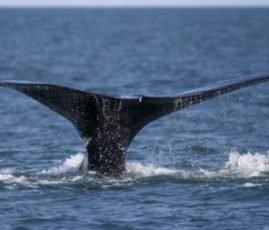
Whale entanglements dropping but threat remains, feds say
The number of whales entangled in fishing gear has declined recently, but the entanglements remain a critical threat to rare species, the federal government said in a report released Tuesday. There were 53 confirmed cases of large whales entangled in gear in the U.S. in 2020, the National Oceanic and Atmospheric Administration said Tuesday. That was a 25% decline from the previous year and a lower figure than the 13-year average, the agency said. Every coastal region except Alaska saw a decrease in whale entanglements, NOAA said. >click to read< 16:06
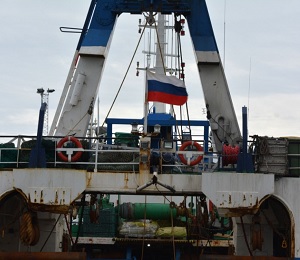
Seafood Biz Braces For Losses Of Jobs, Fish Due To Sanctions
The worldwide seafood industry is steeling itself for price hikes, supply disruptions and potential job losses as new rounds of economic sanctions on Russia make key species such as cod and crab harder to come by. The latest round of U.S. attempts to punish Russia for the invasion of Ukraine includes bans on imports of seafood, alcohol and diamonds. The impact is likely to be felt globally, as well as in places with working waterfronts. One of those is Maine, where more than $50 million in seafood products from Russia passed through Portland in 2021, according to federal statistics. “If you’re getting cod from Russia, it’s going to be a problem,” said Glen Libby, an owner of Port Clyde Fresh Catch, a seafood market in Tenants Harbor, Maine. “That’s quite a mess. We’ll see how it turns out.” >click to read< 13:39
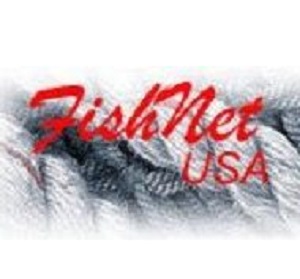
North Carolina Sports target commercial fisheries – example #3 in 2022

Fishery Disaster Assistance: Aid can take years to come through
The designation is supposed to unlock funds to help the communities impacted by those fisheries failures, including communities around Cook Inlet. But it can take years for the money to reach fishermen’s pockets. U.S. Sen. Lisa Murkowski said the timing is one of the problems with the process. “If you’ve had a disaster that happened in 2018, we’re sitting here in 2022 and you’re saying, ‘Really? You think that that’s going to help me?’ In the meantime. I’ve got a boat mortgage that I’ve got to be paying. I’ve got a crew that I’ve got to be paying. This doesn’t help me at all,” she said. >click to read< 16:49
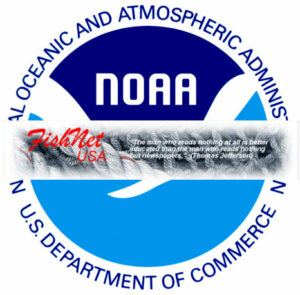
Fisheries management isn’t supposed to be robbing Peter to pay Paul
MAFMC and ASMFC Approve Changes to Commercial and Recreational Allocations of Summer Flounder, Scup, and Black Sea Bass,,, For all three species, these changes result in a shift in allocation from the commercial to the recreational sector. At the same time, using the same “scientific” rationale to disguise what seems nothing more than a blatantly political decision, the Gulf of Mexico Fishery Management has recommended that the red grouper fishery also be reallocated,,, If NOAA/NMFS is allowed to continue using the new MRIP Fishing Effort Survey, every mixed use fishery from Maine through Texas should expect attempts at quota allocation shifts from the commercial to the recreational sector. >click to read< By Nils Stolpe/FishnetUSA 13:52


































